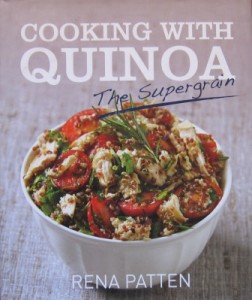1. Protein-Rich Food: Quinoa is a complete protein food containing all nine essential amino acids.
2. High Fiber Content: Twice as much as most other grains, Quinoa’s rich fiber (soluble and insoluble) relieves constipation, lowers cholesterol and glucose levels, and the risk of developing hemorrhoids. Makes you feel fuller for longer and is less “energy dense” which means it has fewer calories for the same volume of food.
3. Rich in Iron: Iron rich Quinoa plays a critical in red blood cells and hemoglobin formation, supplies oxygen to your muscles enabling smooth contraction, and assists in neurotransmitter synthesis, regulation of body temperature, enzyme activity and energy metabolism.
4. Loaded with Lysine: Lysine is an essential amino acid in Quinoa critical for tissue growth and repair, prevention and treatment of herpes infections and cold sores, increasing the intestinal absorption of calcium and eliminating it through the kidneys, increasing muscle mass, lowering glucose, and ameliorating angina.
5. Source of Magnesium: Magnesium in Quinoa helps to relax blood vessels alleviating migraines, promotes healthy blood sugar control, transmission of nerve impulses, body temperature regulation, detoxification, energy production, and the formation of healthy bones and teeth.
6. Contains Riboflavin (B2): Quinoa’s B2 vitamin improves energy production in cells and helps reduce the frequency of attacks in migraine sufferers through increased energy metabolism within the brain and muscle cells.
7. Rich in Manganese: The Manganese in Quinoa is an antioxidant, which helps to prevent damage of mitochondria during energy production as well as to protect red blood cells and other cells from injury by free radicals.
8. Reduces Diabetes Risk: Quinoa is a complex carbohydrate with a low glycemic index, and it’s unusually high protein-to-carbohydrate ratio and abundant soluble fiber, helps Quinoa to regulate blood sugar and slow the breakdown of carbohydrates to glucose. The phenolic acids, vitamin E compounds, cell wall polysaccharides, and other anti-inflammatory nutrients help reduce unwanted inflammation associated with type 2 diabetes risk.
9. Lowers Cholesterol: Quinoa’s soluble fiber latches on to bile acids, expels them from the body, preventing its assimilation into the blood reducing total cholesterol, especially levels of “bad” LDL cholesterol. Quinoa is the best natural vegetarian protein alternative to animal-based protein.
10. Controls Blood Pressure: Quinoa contains the highest levels of the mineral potassium of all grains, essential for stabilizing sodium blood levels, helping maintain blood pressure. Magnesium, a potent vasodilator, also helps to lower blood pressure levels.
11. Supports Weight Loss: Fiber and protein levels in Quinoa increase satiety and the balanced blood sugar levels help reduce binge eating. Fiber aids the smooth accumulation and expulsion of waste through the intestines promoting gastrointestinal regularity. Quinoa provides a low calorie, low sugar, protein and fiber rich, healthy fat alternative.
12. Antiseptic: The saponins present in Quinoa have potent wound healing powers. It significantly reduces inflammation, contracts the wound size, and increases collagen deposition to heal wounds quicker.
13. Gluten-free: Quinoa, as a seed and not part of the grain family, is completely gluten-free. Gluten-free food is considered to be the only diet for people suffering from celiac disease and gluten allergy.
14. Alkaline-forming: Quinoa helps maintain the alkaline balance in the body and has qualities comparable to wild rice, amaranth, and sprouted grains.
15. Vitamins and Minerals Source: Quinoa is a super rich source of heart-healthy monounsaturated fat (oleic acid), omega-3 fatty acid (a-linolenic acid), antioxidant phytonutrients- flavonoids, manganese, magnesium, iron, phosphorus, potassium, calcium, zinc, copper, selenium, Vitamins: B1, B2, B3, B6, B9, E, and soluble and insoluble fiber.
‘Cooking with Quinoa’ is available from Literati Bookstall

